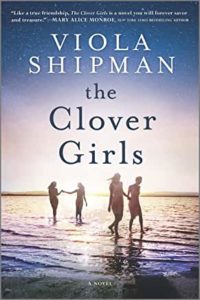 The first thing that came to mind when I read the back cover copy of The Clover Girls by Viola Shipman was Kristin Hannah’s Firefly Lane. Both were about friends and interwove a time slip of a period close to my heart—and personal history.
The first thing that came to mind when I read the back cover copy of The Clover Girls by Viola Shipman was Kristin Hannah’s Firefly Lane. Both were about friends and interwove a time slip of a period close to my heart—and personal history.
Shipman’s story is about four girls—Emily, Liz, Veronica, and Rachel—who first meet in 1985 at a summer camp in Michigan on Birchwood Lake. They’re an unlikely quartet, as they have nothing in common, aside from being first-time sleep-away campers. The story starts with a letter from Emily (who becomes the glue that bonds them) to her parents and sets the tone for the rest of the book.
What I liked:
It’s a compelling plot that plays on the bittersweet memories of any woman from my generation who has an inkling about the pop culture in the mid-80’s. It was a like a who’s who blast from the past.
I also enjoy first-person POV, which Shipman employed in this novel.
I’ve never been to Michigan, but Shipman’s descriptions are vivid enough to tempt me—at least during the summer. I’ve only ever heard horror stories about the winter months. The Clover Girls anecdotes and re-creation of camp games reminded me of the one and only time I ever went to a sleep-away camp myself. It was nostalgic.
This is a clean novel. It is not a Christian fiction, but you don’t have to worry you’ll run into flagrant cuss words or steamy romance.
What I struggled with:
For first-person POV to work well, there should be a clear definition of each of the characters. Their voices and thought-processes should be as distinct as their appearance—and according to Emily’s description of these girls, they look nothing alike. Veronica (or V as she’s called) is a dead ringer for Molly Ringwald. Rachel is super-model beautiful and academy-award-winning talented. Liz “looks like she walked straight off a Madonna video on MTV” and “her hair needs a bunk of its own.” Emily doesn’t have much of a description, but it’d be a spoiler alert if I told you why.
The problem I found with Shipman’s novel was that if there hadn’t been a heading above each scene to tell the reader whose POV it was, I couldn’t have picked one out from another. There was nothing characteristic about them individually, so it made it difficult for me to connect.
I also felt the structure was lacking. There were no clear plot points to guide the reader. No highs or lows, unless one counts juvenile angst. Each of the adult characters were unhappy with their lives. Each felt they’d lost the essence of who they were as they grew. By the end of the story, not much had happened except they came together, forgave each other for the hurts they’d inflicted in childhood, and replayed camp games. It was wrapped up nice and tidy in the end, but without the characters showing true growth. Instead of them taking control of their lives, everything just sort of worked out.
Three out of five stars






